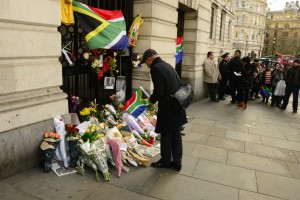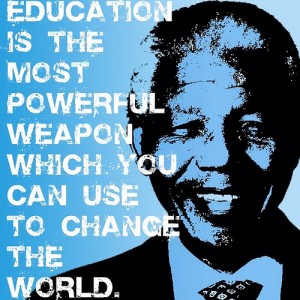After his death on Dec. 5, the nation that Nelson Mandela fought so hard to help came together, supported by the whole world, to mark his passing.
“Our nation has lost its greatest son. Our people have lost a father,” said South African president Jacob Zuma, according to CNN. “Although we knew that this day would come, nothing can diminish our sense of a profound and enduring loss.”

Crowds gathered around Mandela’s house in Johannesburg, South Africa, showing grief and gratitude from all races.
The gathering was marked more by celebration of Mandela’s life than by anguish at his passing. South Africans held candlelight vigils, took part in prayer groups, and sang songs, some of which were sung in Mandela’s native isiXhosa language.
Others performed the toyi-toyi dance in remembrance, a shuffling dance harkening back to the marches protesting apartheid. Enough wreaths and flowers were laid outside Mandela’s former home to form a small wall.
“[In death] Mandela has once again united the country, they are coming back together to mourn his passing and to celebrate his life,” said Jarrod Coombes, a Bay Area resident raised in South Africa. “He was much more than just a leader to the country. His passing represents the end of an era.”
Mandela, also known by his tribal name Madiba, has been hailed as a freedom fighter, moral compass, and South Africa’s symbol of its struggle against racial inequality.
Mandela led protests against apartheid in South Africa– a system of segregation that denied basic rights to blacks, including citizenship and voting rights, and enforced white minority rule. Mandela was imprisoned for 27 years but refused to compromise his views in exchange for a reduced sentence or freedom. Mandela was released in 1990 and went on to become South Africa’s first black president, elected by the country’s first free multiracial election.
Carlmont teacher Michelle McKee said that “[Mandela] should be remembered for not giving up on himself, his people, or his country” and that “he could have emerged [from prison] broken and resigned to a quiet life,” but “came out with strength, dignity, and compassion and a resolve to change South Africa for the better.”
“He will always be remembered as the man who brought democracy and freedom to South Africa,” said Coombes. “And one of the very few political leaders to unite a country that was thought to be fiercely divided.”
With sadness, Coombes said that “the world has truly lost a great man.”
Condolences poured in from all over the world. Prime Minister David Cameron of the United Kingdom declared that “a great light has gone out.”
Pope Francis noted “the steadfast commitment shown by Nelson Mandela in promoting the human dignity of all the nation’s citizens and in forging a new South Africa.”
The list of political leaders who have spoken kindly in memoriam of Mandela includes President Vladimir Putin of Russia, Canadian Prime Minister Stephen Harper, Belgian Prime Minister Elio Di Rupa, Indian Prime Minister Manmohan Singh, Queen Elizabeth II of Britain, and Syrian President Bashar al-Assad, among countless others.
President Obama said of Mandela, “He no longer belongs to us– he belongs to the ages,” echoing the words spoken to mark the death of Abraham Lincoln.
Obama ordered all U.S. flags to be flown at half-staff in a show of respect until midnight Dec. 9. European flags in Brussels, Belgium also flew at half-staff on Dec. 5, as well as the French flag on the Elysee presidential palace in Paris.
A common sentiment expressed among South Africans is the hope that South Africa will continue to carry on Mandela’s legacy and pursue his moral and political vision.
A page on nelsonmandela.org states, “Let us stand together now and in the days ahead, and do what needs to be done to honour with dignity Tata [Father] Madiba. […] His legacy lives on in all of us– it is in our hands now. Hamba kahle Madiba. [Farewell Madiba]”
As Zuma said, “Nelson Mandela brought us together, and it is together that we will bid him farewell.”


